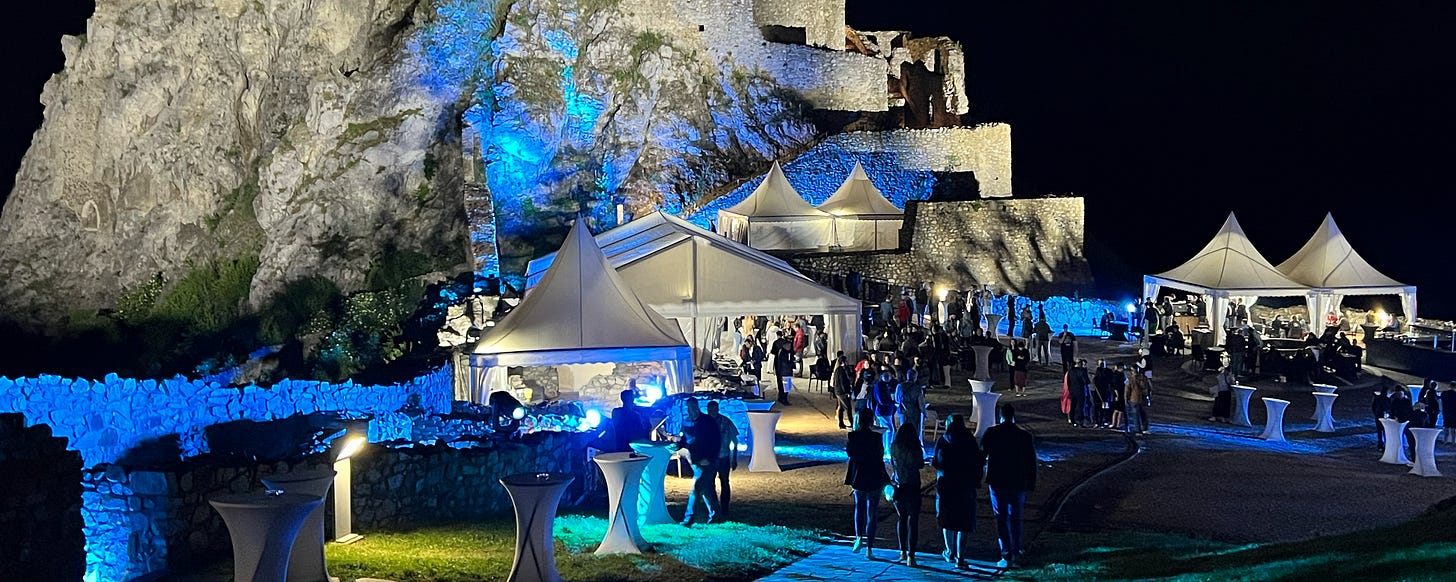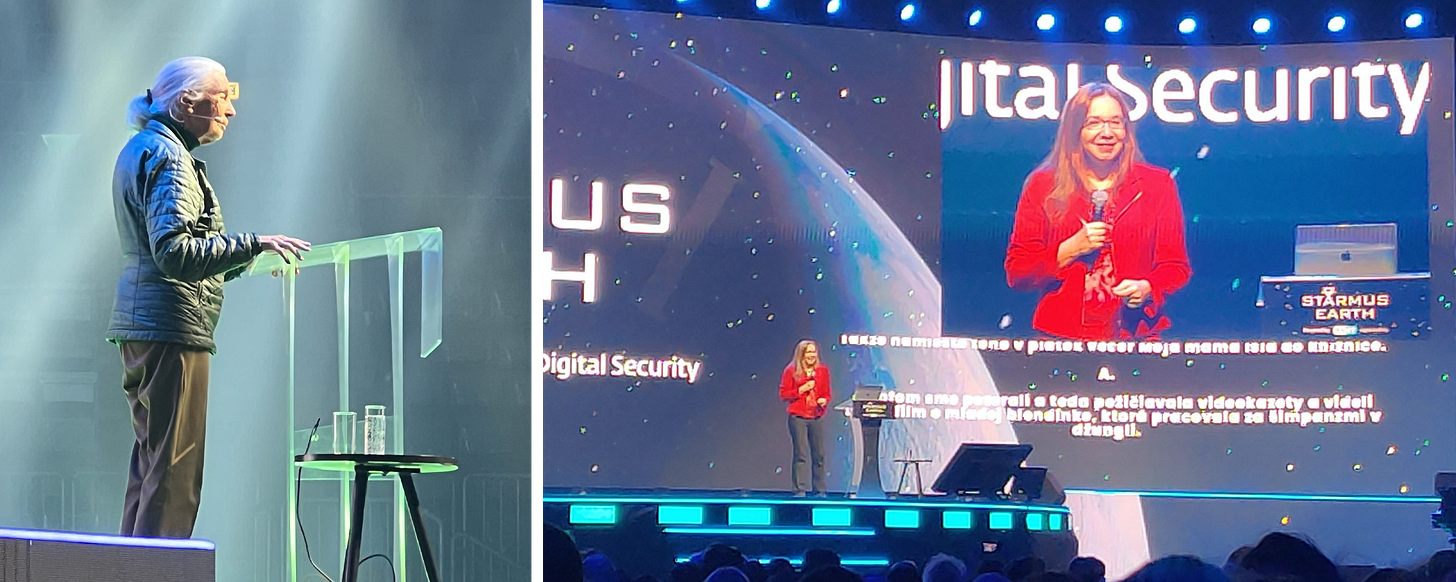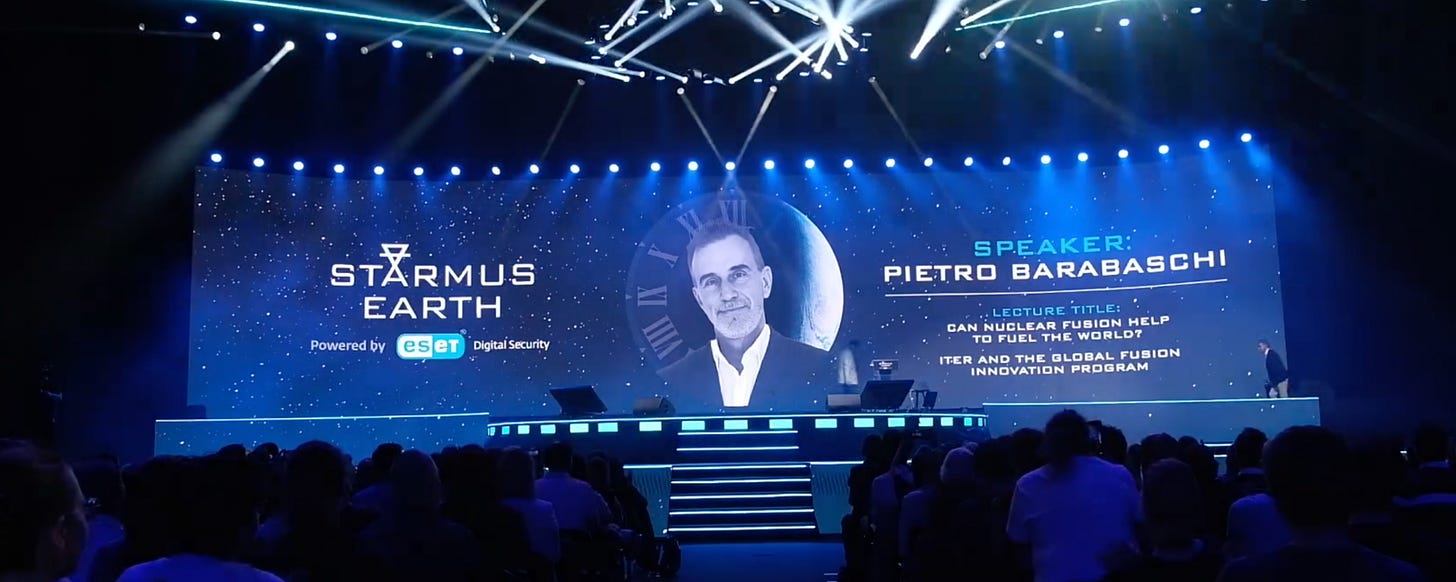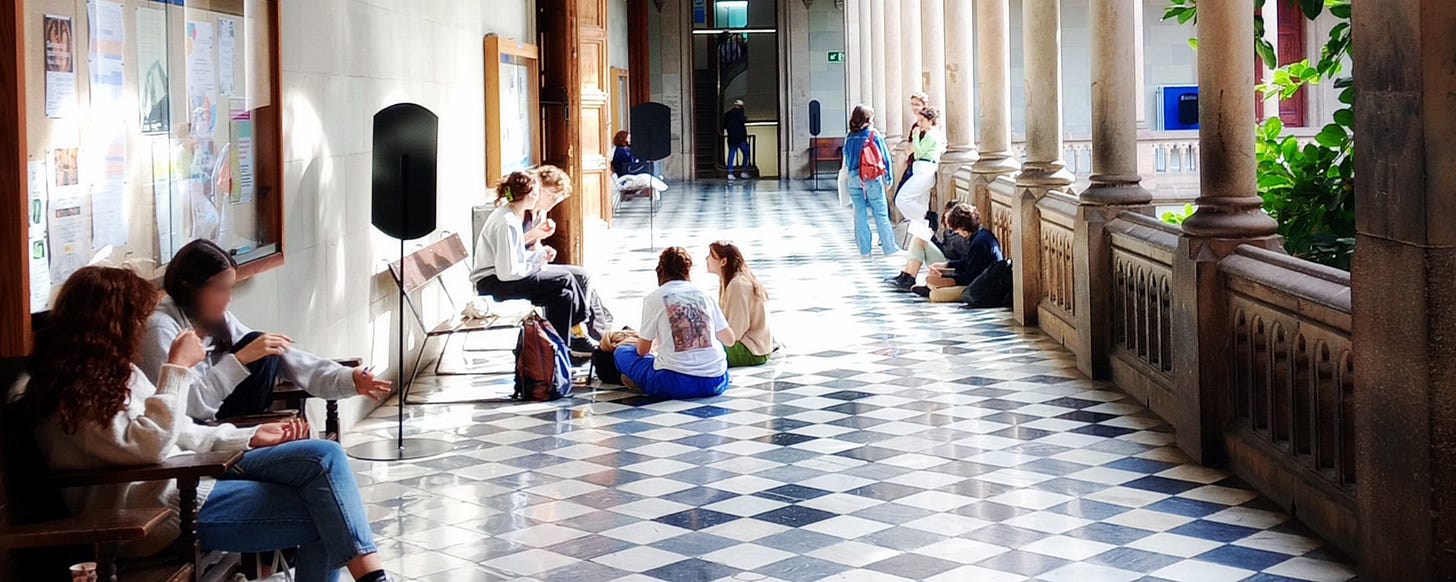A science festival that envisions our planet’s future
Jane Goodall on hope, Pietro Barabaschi on nuclear fusion, and students push for climate in the curriculum
Last week I participated in a number of events at the STARMUS science festival. Co-founded by musician Brian May and astrophysicist Garik Israelian, the festival usually features astronauts and Nobel prize-winners talking about physics and the universe. This year, though, the festival was titled "The Future Of Our Home Planet” and included talks by Ukrainian climate scientist Svitlana Krakovska, paleoclimatologist Mo Raymo, environmental economist Nathaniel Keohane, marine biologist Sylvia Earle, and many more.

This year, the festival was held in Slovakia, a country that just last month phased out its last coal-fired power plant, the Vojany power station in the eastern district of Michalovce. The phase-out was expected to be completed at the end of the decade, but the country pushed forward the deadline to 2024. Slovakia now joins the ranks of other coal-free European countries, a list that includes Austria, Belgium, Portugal, and Sweden. Slovenské Elektrárne, the company that owns the shuttered plant, plans to devote the space to a solar park or battery storage in the future.
GOOD NEWS

Famed primatologist Jane Goodall opened the festival with a rousing keynote address titled Reason for Hope. “Isn’t it fascinating that it’s because of our exploration in the space that we had the first stunning image of our own planet Earth, that beautiful green and blue planet, taken from space? People began to realize this is a very fragile planet,” she said. “And I think that’s a wake-up call for all the people on Earth to realize that this is our only home; we better start protecting it.”
“Climate change is not something that we’re facing in the future, it’s here and now,” she added. Our actions now will impact our future, “and you as an individual have a role to play. You’re on this planet for a reason, I believe. Every single day that you live you make some impact on the planet."
"People say to me, ‘But Jane, I am just one person, the problem is huge, what can I do?’ Think about the deserts; one drop of rainfall, that won’t make any difference. But when billions of billions of raindrops fall, that wakes up the life beneath the sand, and it blooms, and the desert comes to life. That’s what all of you can do. Just remember, cumulatively we can change the world!”
As you can imagine, I loved that message - and I got to speak next, right after her, with a talk titled “The most important equation.” In it, I outlined how hope is the sum of the information we get from science + the concern we feel over its impacts + the actions we take to mitigate this harm. Appropriately, I began with a story of the influence Jane had on my own life, which you can watch here!
NOT-SO-GOOD NEWS
One of the panels I was on also included Pietro Barabaschi, the director general of ITER – the International Thermonuclear Experimental Reactor. His talk was titled “Can nuclear fusion help to fuel the world?” His answer was, “Not in my lifetime” – and former U.S. Secretary of Energy Steven Chu, another speaker at the conference, agreed.
Fusion is a zero-carbon source of electricity that produces no long-term radioactive waste and could do much good for humanity. But the bad news is it is still decades away from practical, large-scale implementation. Many companies are trying to develop fusion energy, but “those efforts have been plagued by false starts, broken promises and gargantuan cost overruns. A grim joke has taken hold in the field: Fusion is the energy of the future — and it always will be,” NPR reported last December.
While fusion might be far away, nuclear fission also produces carbon-free electricity. Although fission generates nuclear waste that needs to be safely and securely disposed of, and raises concerns regarding nuclear accidents and weapons proliferation, the main reason most countries aren’t building more conventional nuclear in recent years is far more pragmatic: it’s simply due to skyrocketing costs.
One recent innovation in traditional nuclear is Small Modular Reactors (SMRs), compact nuclear reactors that can be combined to form larger plants. In the U.S., a new company NuScale planned to build six 77-megawatt SMRs in Idaho that would begin operation in 2029. Last November, however, after cost overruns, they scrapped their plans. A similar plan by Rolls Royce to build SMRs in Poland, each of which could power a million homes, progressed to the next stage this week – but at the same time, the company scaled back their plans to build SMR factories in the UK.
I often run into advocates of nuclear power who claim it can solve all our problems. The balance of the evidence, however, suggests that while nuclear is certainly one of the portfolio of viable climate solutions available to decarbonize the electricity sector, its high costs remain a significant barrier to realizing its potential.
WHAT YOU CAN DO
Want the next generation to learn more about climate change and how we can fix it? Call for more climate change to be included in science curriculum in local schools!
Last February, high school and college students from Minnesota went to the state capitol building in St. Paul to lobby state lawmakers to support a bill to make schools teach more about climate change.
A year ago last November, a group of students occupied a hallway at the University of Barcelona until the university agreed to offer a compulsory course on climate change. Starting this year, “the University of Barcelona will administer a course to all its 14,000 students and become one of the first educational institutions to make a compulsory class on the physical and social effects of the climate crisis.”
Raising your voice is particularly important in U.S. states like Texas and Florida, where lawmakers and state education officials actively are making it more difficult to learn about climate change, and Arizona where legislators are considering a bill that could prohibit climate research in universities across the state.
“What an unfair reality to have a young person graduate from high school,” said Leah Qusba a, executive director of nonprofit Action for the Climate Emergency, “without knowing about the biggest existential threat that they’re going to face in their lifetime.” And most people agree: even in states like these, well over 70% agree that schools should teach about the causes, consequences, and potential solutions to climate change.
Weds., May 22nd at 7pm ET - Collective Honesty and Complicated Hope with The BTS Center and One Hope One Future - virtual





I wish you had included in the "What you can do," to lobby your politicians to tax emissions of CO2 and methane and talk to your friends nd relatives to encourage them todo the same. A "billion raindrops" of support for taxation of CO2 and methane emissions over a long enough period , would surely cause a flood that would wash away the opposition.
NATURE’S GENEROSITY IS NOT FOREVER.
ENVIRONMENTAL SOVEREIGNTY
This proposal advocates for a significant paradigm change in how we perceive, understand, and manage the roots of global warming. That shift is essentially moving away from the present general basic beliefs of what is considered Sovereignty in our days, that is, “the supreme power or authority of each country within their official boundaries admitted by the rest of the countries of the world”.
We find very damaging the claim “within their official boundaries”. Why?, because it allows countries to do, environmentally speaking, whatever they want, whatever they choose, if it is “within their official boundaries “. It is a claim universally accepted in Constitutions of the world. That unlimited power is wrong. It challenges that the environment Is a shared global resource that transcends countries’ political boundaries and that is why we introduce and propose ENVIRONMENTAL SOVEREIGNTY which is totally divorced from the reigning notion of Sovereignty as far as the environment is concerned.
ENVIRONMENTAL SOVEREIGNTY means that the environment is universal and not politically parceled or divided, proportionally or not amongst countries of the world. We find that the present division of the environment amongst countries of the world could well be the major cause of global warming.
However, countries do not accept the assertion that “the environment is a shared global resource that transcends national boundaries. On the contrary, countries take for granted that, within its borders, the environment is a rightfully earned and inherited property and therefore countries have an absolute free hand to do environmentally whatever they wish within those borders, which countries call “SOVEREIGNTY”. It is Sovereignty all right, but it is BAD SOVEREIGNTY.
In sum….
1) Countries policies cannot be a dominant factor reigning above the Environment. THE ENVIRONMENT is beyond not only of what countries presently call SOVEREIGNTY but also above their Judicial, Legislative and Administrative powers, a “Power above Powers”.
2) Political authoritarianism and lack of or improper enforcement of pro-environment laws is a very damaging factor that significantly impacts the environment.
3) Worldwide environmental degradation will continue until the present concept of SOVEREIGNTY is changed and the world accepts that there are two kinds of sovereignty in its place: GOOD SOVEREINTY or BAD SOVEREIGNTY. The first respects the environment as a power above all powers. The second, does not.
4) What does this all mean:
1) Human presence anywhere in the world should not be indifferent to the environment. When it is in a positive way, we call it GOOD SOVEREIGNTY. If it is in a negative way, we call it BAD SOVEREIGNTYY
2) Caring for the environment is not only an obligation but also an art.
3) The environment has been and will be considered always the backbone of any country, city of community and as such it most respected and cared for accordingly.
What do we propose?
Eradicate BAD SOVEREIGNTY from the world and replace it with GOOD SOVEREIGNTY, which prioritize global environmental interest above all other interest. Highlighting the interconnectedness of environmental health with global well-being is a thought-provoking argument. Quite easy to say, almost impossible to achieve, but it can be done, and must be done, the sooner the better. Constitution must therefore be changed accordingly. It will take time and resources, but we don’t see any other way out if we want a world for future generations. Big International Money will oppose it of course, just as political interests and arrogance, ignorance, fear, and indifference, but facts are facts: NATURE’S GENEROSITY IS NOT FOREVER.
So, being a published writer (in Spanish), I decided to change tactics to be heard, hopefully. A screen play idea came to my mind. To convey the message through a screenplay set in Australia is innovative and has the potential to reach a wide audience, especially when considering the power of storytelling in raising awareness and inspiring action. I prepared a screenplay on the matter based in Australia. I find a creative and engaging way to communicate my ideas to a wider audience. As a writer, I know that using storytelling to convey complex concepts can be incredibly effective, especially when addressing issues as urgent, complex, and manifold as environmental conservation. Hopefully, it may catch a producer’s eye or Leonardo Di Capri’s interest as the official UN representative for the environment, and we can take it to the screen for worldwide view and understanding. I will gladly send some chapters of the play, free, upon request to SOBERANIA.AMBIENTAL.GLOBAL@GMAIL.COM.
This is my way of reaching out directly and I do hope I will find followers in this journey. Please help me spread the word and share it.
Thank you.
Jorge Partidas A
jorgepartidas@gmail.com
Venezuela